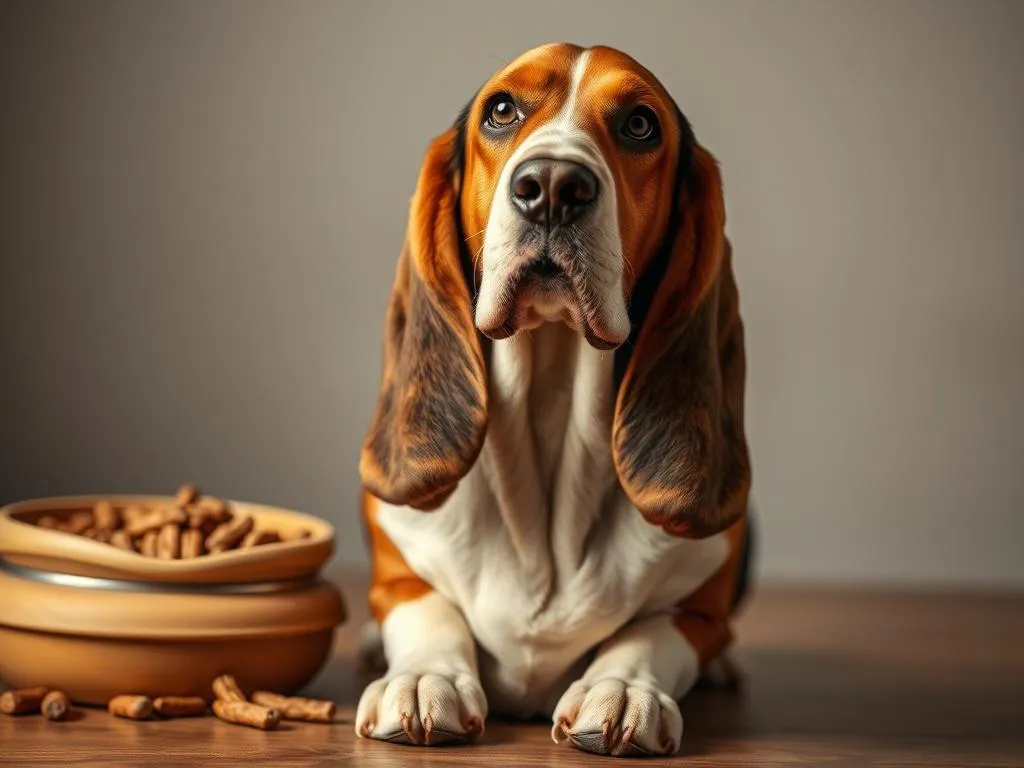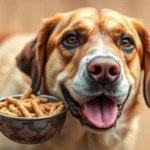
Introduction
Basset Hounds are a unique breed known for their distinct appearance and lovable demeanor. Their long ears, droopy eyes, and short legs make them stand out, but they also come with specific nutritional needs that owners must consider. Proper nutrition is crucial for maintaining a Basset Hound’s health and well-being, especially given their predisposition to certain health issues. This guide aims to help you identify the best dog foods for Basset Hounds, ensuring that your furry friend receives the nutrition they require to thrive.
Understanding Basset Hound Nutrition
Nutritional Requirements
When selecting food for your Basset Hound, it’s essential to understand their nutritional requirements:
-
Protein: A high-quality source of protein is vital for muscle maintenance and overall health. Basset Hounds typically require a diet rich in animal proteins to support their active lifestyle.
-
Carbohydrates: Carbs provide the necessary energy for daily activities. However, the source of carbohydrates matters; opt for whole grains and vegetables that offer fiber and nutrients.
-
Fats: Essential fatty acids, particularly Omega-3 and Omega-6, are crucial for skin and coat health. Basset Hounds can benefit from diets that include fish oil or flaxseed.
-
Vitamins and Minerals: These nutrients support bone health and immune function. Ingredients such as fruits and vegetables are excellent sources of vitamins and antioxidants.
Common Health Issues in Basset Hounds
Understanding common health issues can further guide your choice in dog food:
-
Obesity: Basset Hounds are prone to obesity, which can lead to various health problems, including diabetes and joint issues. It’s essential to monitor their weight and choose foods that support weight management.
-
Hip Dysplasia: This genetic condition affects many Basset Hounds, making joint health a priority. Diets rich in glucosamine and chondroitin can help support joint function.
-
Ear Infections: Their long ears can trap moisture and debris, leading to infections. A diet that promotes overall health can mitigate the risk, and some owners find success with probiotics.
Factors to Consider When Choosing Dog Food for Basset Hounds
Age and Life Stage
The dietary needs of Basset Hounds differ based on their life stage. Puppies require more calories and nutrients for growth, while seniors may need lower calorie diets to prevent weight gain.
Weight Management
Given their tendency to gain weight, selecting low-calorie options and practicing portion control is crucial. Look for foods labeled “light” or “weight management.”
Allergies and Sensitivities
Basset Hounds can experience food allergies, often manifesting as skin irritations or digestive issues. Identifying these allergies is key to choosing the right food. Common allergens include beef, chicken, and grains.
Ingredient Quality
High-quality ingredients lead to better health outcomes. Look for foods with whole meats as the first ingredient and avoid fillers like corn and soy. Understanding dog food labels is essential for making informed decisions.
Types of Dog Food Suitable for Basset Hounds
Dry Kibble
Advantages: Dry kibble is convenient, economical, and helps maintain dental health through chewing.
Disadvantages: Some dogs may find kibble less palatable compared to wet food.
Recommended Brands:
– Brand A: Features high-quality protein sources and healthy fats.
– Brand B: Known for added joint support ingredients.
– Brand C: Focuses on grain-free options suitable for sensitive stomachs.
Wet or Canned Food
Benefits: Wet food can enhance hydration and is often more appealing to picky eaters.
Recommended Brands:
– Brand D: Made with real meat and no artificial preservatives.
– Brand E: Offers a variety of flavors to cater to different tastes.
Raw Diet
The raw feeding trend emphasizes uncooked, whole foods.
Benefits: Some owners report improved coats and energy levels in their dogs.
Potential Risks: Nutritional imbalances and food safety concerns must be considered. Always consult a veterinarian before switching to a raw diet.
Homemade Diets
Creating a balanced homemade diet can be rewarding.
Guidelines: Ensure that you include a variety of proteins, vegetables, and grains. Consulting a veterinarian or a pet nutritionist is essential to ensure nutritional balance.
Top Recommended Dog Foods for Basset Hounds
Best Dry Kibble Options
- Brand A: Rich in protein and includes joint support supplements. Ideal for maintaining a healthy weight.
- Brand B: Grain-free formulation with high-quality ingredients that cater to dogs with sensitivities.
- Brand C: Features added probiotics for digestive health, making it a great choice for Basset Hounds prone to stomach issues.
Best Wet or Canned Food Options
- Brand D: Contains high meat content and no artificial additives, ensuring a nutritious meal.
- Brand E: Offers a balanced diet with added vitamins and minerals to support overall health.
Best Raw Food Options
- Brand F: Known for its balanced raw meals that incorporate various meats and vegetables, suitable for those considering a raw diet.
Best Homemade Recipes
- Chicken and Rice
- Ingredients: 1 cup cooked chicken (shredded), 1 cup brown rice, 1/2 cup carrots (chopped), 1/2 cup peas.
-
Directions: Mix all ingredients, serve at room temperature.
-
Beef and Vegetable Stew
- Ingredients: 1 cup ground beef, 1 cup sweet potatoes (cubed), 1/2 cup green beans.
- Directions: Cook all ingredients in a pot until fully cooked, cool before serving.
Feeding Guidelines for Basset Hounds
Portion Control
General feeding amounts should be based on weight and activity levels. A typical adult Basset Hound may require 1.5 to 2.5 cups of kibble daily, divided into two meals.
Feeding Frequency
For optimal health, it’s recommended to feed Basset Hounds two meals a day. This helps regulate energy levels and aids digestion.
Treats and Snacks
Offer healthy treats like carrots or apple slices in moderation. Ensure that treats do not exceed 10% of their daily caloric intake to maintain a balanced diet.
Monitoring Your Basset Hound’s Health
Signs of Nutritional Deficiencies
Watch for symptoms such as dull coat, lethargy, or digestive issues, which may indicate nutritional deficiencies. Regular observation can help catch problems early.
Regular Vet Check-ups
Routine veterinary visits are vital for monitoring your Basset Hound’s health. Your vet can provide tailored dietary recommendations based on your dog’s specific needs.
Adjusting Diet Based on Life Changes
As your Basset Hound ages or experiences health changes, their dietary needs may shift. Regularly assess their weight and health, and adjust their diet as necessary.
Conclusion
Tailoring nutrition to meet the unique needs of Basset Hounds is essential for their overall health and happiness. Focusing on high-quality dog food choices can significantly impact their well-being and longevity. Always consider consulting with a veterinarian to ensure that your Basset Hound receives a balanced and appropriate diet for their individual needs. Prioritize your furry friend’s nutrition, and they will reward you with love and companionship for years to come.









